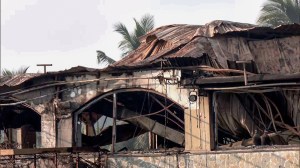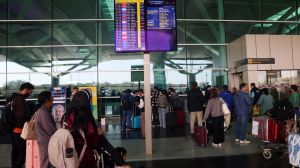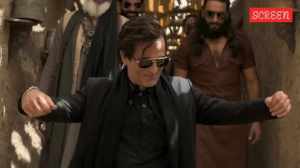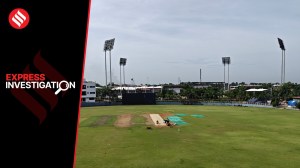Deepak talks,reveals difference of opinion with boss Kishenji
For the first time,there are indications of differences within the ranks of the CPI(Maoist). In his interrogation over the past 72 hours,Deepak,aka Venkateswara Reddy,a West Bengal state committee member of the underground outfit....
For the first time,there are indications of differences within the ranks of the CPI(Maoist). In his interrogation over the past 72 hours,Deepak,aka Venkateswara Reddy,a West Bengal state committee member of the underground outfit who was arrested on March 2,has revealed his differences of opinion with the party line and leadership including his own organisational supremo,Kishenji.
Another key disclosure in Deepaks interrogation report,a copy of which is with The Sunday Express,is the close cooperation between the Maoists and Trinamool Congress (TMC) leaders during the Nandigram agitation. Deepak has acknowledged that he worked in tandem with the Trinamool leadership who were in the Bhumi Uchchhed Protirodh Committee (Committee Against Eviction from Land). The interrogation report is now with the state home department.
Highly placed officials in the state police administration,while giving credence to the reported differences talked about by Deepak,acknowledged a lurking suspicion about the possibility of deliberate and voluntary leakage of information that facilitated Deepaks dramatic arrest in what was made out to be a 17-hour stakeout.
While security agencies did not want to elaborate on the issue at this stage,they admitted that the Maoist leader has spoken about his differences with Kishenji and his willingness to come to the surface from a life in the underground. We are working on this aspect of his growing distance with CPI(Maoist) leadership but cannot divulge more at this stage, said an official who interrogated him several times in the past 72 hours.
There are however,explicit and candid confessions of his phases of difference with the CPI(Maoist) leadership.
According to his statement,his first brush with the leadership was in the middle of 2003 with his mentor a person named as Manikda, who was reported to have later left the outfit. The differences of opinion cropped up following the arrest of Sudip Chongdar,another Maoist leader,in 2003. The state committee intervened and sent Deepak to West Midnapore.
He was given charge of the Belpahari-Bandwan region an area which till date continues to be the strongest Maoist domain and strategically located near Jharkhand.
His stay at Belpahari-Bandwan,from 2003 to the middle of 2006,must have been the most bloody chapter in his life. The interrogation report says he masterminded at least six major attacks,including the killing of an officer in charge of Bandwan at Lotojharna jungle (11.10.2003),the killing of seven policemen in Daldali in Kankrajhore (25.02.2004),the killing of five EFR personnelat Bankisole(14.10.2004),and the killing of three police personnel at Tarafeni (26.2.2006).
In the middle of 2006,Deepak once again became frustrated at the continuing violence by Maoists. His differences of opinion with the party line resulted in him staying away from the party work temporarily. He removed himself from field operations and engaged in the study of party literature. Towards the end of 2006,Deepak was sent to work in Singur,where he remained till the middle of 2007. But he reportedly failed to make much headway in Singur because of weak organisational strength. He was shifted to Nandigram in May 2007,where he continued to hold charge till his arrest on March 2. In Nandigram,Deepak came in close contact with Nishikanta Mondal,a TMC/BUPC leader,and one Narayan aka Selim of Haldia,according to the report. He brought in Maoist cadres from Lalgarh,with Mondal providing them all sorts of logistic support. During this time he had meetings with Subhendu Adhikari,(now the TMC MP from Haldia). Sheikh Sufian,Abu Taher,Abdus Samad and other prominent leaders of the TMC/ BUPC of the area, says the interrogation report. Deepak had brought in about 50 armed tribals who were sheltered at Satengabari. It could be learnt that at a later stage,the CPI(Maoists) developed differences with the Trinamool Congress leadership of Nandigram the fallout of which was the murder of Nishikanta Mondal. Mondal was gunned down by unidentified motorcycle-borne assailants on September 22,2009.
Subhendu Adhikari,when contacted about alleged links between Maoists and the TMC/BUPC,said: This is nothing new. Md. Selim and other CPM leaders have been hurling the same accusations against us. Now the state CID,an agency of the Left Front government,is being used to malign us. Everyone knows the elections are round the corner and this will be made an issue by the Communists. He added: Nandigram was a peoples agitation and there was no need for any help from the Maoists. The Maoists have given death threats to me and to our leader Mamata Banerjee. We have written to the PM too about those threats. We are certainly in favour of tribals but not in support of the Maoists.
According to the interrogation report,Deepak joined the PWG in 1995 as an Andhra cadre,and after merger with CPI(ML) PW,he became a member of the CPI(Maoist). Contrary to popular perception,Deepak was neither a central committee member nor a politburo member. He was also not a central military commission member as had been reported earlier. Deepak became a West Bengal State Committee member along with 10-12 others in the last Party Congress of CPI (Maoist) held in February 2007,at Bhimbandh near Jamui in Bihar. Deepak has talked about state committee members from Hooghly,North 24-Parganas,Kolkata and West Midnapore and his close associates in the organisation. In his initial years,Deepak set up his base at R G Kar Medical College and Hospital in north Kolkata,having shared a hostel room with a doctor who was a party sympathiser. He worked extensively in areas in the northern outskirts of the city like Agarpara,Belghoria,Sodepur,Dum Dum,Barasat,Naihati and Uttarpara and Konnagar in Hooghly district.
- 01
- 02
- 03
- 04
- 05































